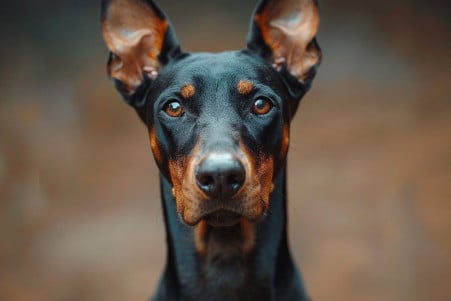Do Dachshunds Cause Allergies? The Truth About Dachshund Allergies
20 February 2024 • Updated 19 February 2024

As more and more people develop allergies, the search for hypoallergenic pets becomes increasingly important. Unfortunately, Dachshunds, also known as wiener dogs, are not hypoallergenic. They shed hair and create dander, which are two of the most common pet allergens. As a result, people with allergies to pets may be allergic to Dachshunds, and you should be careful about getting one if you have pet allergies.
This article reviews multiple scientific studies and evidence-based articles about pet allergies, with a specific focus on Dachshunds. It explores the factors that determine whether a dog is hypoallergenic, including the type of fur the dog has, how often the dog sheds, and how much dander the dog creates.
This information will help you understand what makes a pet more or less suitable for people with allergies and what you can do to manage your allergies if you’re set on getting a wiener dog.
Are dachshunds hypoallergenic?
The Myth of the Hypoallergenic Dog
The search for a dog that won’t make you sneeze has made the term ‘hypoallergenic’ a popular one in the world of dogs. But the idea of a truly hypoallergenic dog is a myth. According to the American Kennel Club, no dog, including Dachshunds, can claim to be completely hypoallergenic.
All dogs produce dander, saliva, and urine, all of which contain proteins that can cause allergic reactions in people who are sensitive to them, regardless of the dog’s breed or how much they shed.
The myth of the hypoallergenic dog has been perpetuated by the idea that dogs that shed less, like Poodles or Bichon Frises, are less likely to cause allergies. But a study cited by the American College of Allergy, Asthma, and Immunology notes that all dogs produce allergens. Dachshunds, even with their different coat types, also produce these proteins, although their shedding and grooming needs are different.
People with allergies can still live with dogs if they take steps to manage their allergies, such as using HEPA filters and keeping pets out of the bedroom.
But the myth of the hypoallergenic dog remains strong, even for those who are allergic to dogs. This is why it’s important for people with allergies to understand the truth about pet allergens if they want to have a dog, even if they’re drawn to the idea of a hypoallergenic one.
How Dog Allergens Impact Allergies
For people with pet allergies, it’s important to know about dog allergens. In general, allergens are proteins that can cause an allergic reaction when they are encountered by someone with a sensitized immune system. According to the National Institute of Environmental Health Sciences, dog allergens are found in dander, saliva, urine, and even blood, and all dog breeds, including Dachshunds, have them.
Dander is made up of tiny bits of skin that are a primary source of allergens. In people who are allergic, these proteins can cause symptoms like sneezing, itching, and asthma.
The American Lung Association notes that dander is small and has a jagged shape, which makes it easy for it to become airborne and stick to surfaces, leading to prolonged exposure. Hair and saliva can also spread these allergens by sticking to surfaces or becoming airborne.
There are specific proteins that have been identified as impacting people with allergies, including Can f 1 in dogs. These allergens are produced by Dachshunds regardless of their coat type and can be spread through the environment and stick to surfaces for long periods of time.
It’s important for people with allergies to manage their exposure to these allergens. We’ll go into more detail about Dachshund coats and grooming habits that can help reduce the presence of allergens.
Understanding Dachshund Coats: Allergies and Maintenance
Dachshunds come in three coat types: smooth, longhaired, and wirehaired. Each coat type requires different maintenance and has different shedding patterns, which affects the production and distribution of allergens in the home.
Smooth-coated Dachshunds have a short, dense coat that is a moderate shedder, while longhaired Dachshunds have a long, sleek coat that needs regular brushing to prevent shedding and allergen distribution. Wirehaired Dachshunds have a thick, rough outer coat and a softer undercoat, which is a low shedder but requires regular maintenance to prevent allergen buildup.
Maintenance is a key factor in controlling allergens. Regular and thorough maintenance, as one study notes, can help control allergen levels. For example, brushing can help remove loose hair and dander, and bathing can help remove built-up allergens. A study in Genes found that genetic factors, including MYO5A gene variants, can affect coat color and texture, which can in turn affect allergen production.
Owners need to make sure they are maintaining their dog’s coat type to keep dander and other allergens at bay. It’s important for owners to adjust their maintenance routines based on their Dachshund’s coat type to help reduce the risk of allergic reactions in those who are sensitive. Understanding how genetic differences, such as those in the MYO5A gene, can impact coat types can also help allergy sufferers choose a pet.
How to Live With Allergies and Still Have a Dog
For people with allergies who want to have a dog, the choice of pet is key. While no dog is truly hypoallergenic, as The Humane Society of the United States notes, some dogs are better for people with allergies. The organization recommends people choose dogs that are less likely to cause allergic reactions, such as Poodles and Schnauzers, and certain cats, including the Siberian and Balinese.
In addition to these choices, the American College of Allergy, Asthma, and Immunology recommends a number of things to do at home to reduce allergens, including using HEPA filters, having pet-free areas, and choosing hard floors over carpet. People can also reduce allergens by bathing and grooming their pets, although it’s important not to bathe them too often, which can cause them to produce more dander.
Medical treatments are also important. Over-the-counter antihistamines, nasal sprays that contain steroids and antihistamines, and immunotherapy are all treatments that Penn Medicine Becker ENT & Allergy says can help people manage their allergies so they can have dogs, including Dachshunds. When these treatments are used alongside home modifications and pet care, they make it more feasible for people with allergies to coexist peacefully with their pets.
Recap: Do Dachshunds Have Allergens?
If you’re looking for a dog that’s hypoallergenic, Dachshunds are not the dog for you. As we’ve learned more about dog allergens, we’ve found that all dogs produce allergens to some extent. This includes Dachshunds, who are known for their lovable personalities and unique coats. Dachshunds, like all dogs, produce the proteins that cause allergic reactions, and they also produce the dander and saliva that can cause allergic reactions.
Anyone who is thinking about getting a dog and has allergies should be aware of the facts about allergens and how to manage them in their home. While no dog is completely hypoallergenic, there are steps you can take to reduce the amount of allergens in your home, including regular grooming and keeping your home clean.
It takes work and knowledge to have a pet when you have allergies. However, if you’re determined to get a Dachshund or any other breed, you can find ways to reduce allergens and get advice from your doctor on how to make it work. Just remember, the more you know and the more you prepare, the easier it will be to live with the pet you choose.


